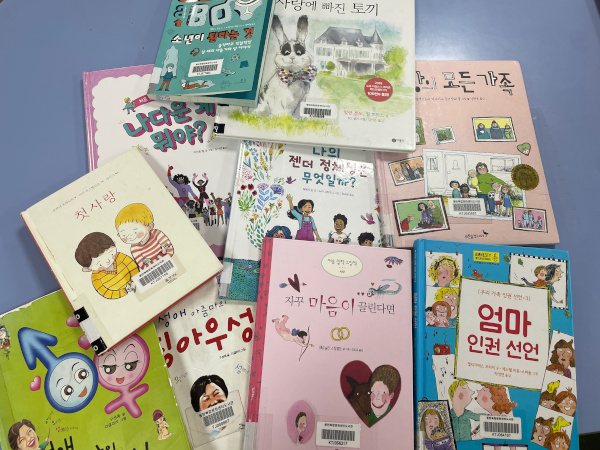Books on homosexuality were displayed in the children’s and infants’ library at the Dongtan Complex Cultural Center in Hwaseong, Gyeonggi-do, on Nov. 21. Many of the 66 books were listed as suicide books by parent groups.
‘Most teens, regardless of gender, fantasize about sex with someone of the same sex.’ ‘Many people like having sex with ○○’ ….
It’s the afternoon of the 21st in the children’s and infant library on the first floor of the Dongtan Complex Cultural Center Library in Hwaseong, Gyeonggi-do. As I opened the book “Becoming a Boy” on the shelf in the children’s section, I cringed at the explicit content that seemed to promote homosexuality. The book, which was placed in the middle of the aisle where children, who make up the majority of the library’s patrons, pass by, was one of 11 books recently reviewed by the Publication Ethics Committee (KANYUN) out of 66 books on sex education that have been criticized as harmful to youth. Despite the criticism of the book by the Kookmin Ilbo last year (see Sept. 14, 2023, and Oct. 19, 2023), the KFTC recently deemed it “not harmful.”
The library we visited is one of the most visited public libraries (108,115 visitors in 2023) in Hwaseong, the city that ranks first in the country in the number of births. It was a weekday afternoon, and the library was full of children who came to read after school. The library had 43 out of 66 teen suicide books, including books such as “If You Can’t Stop Yourself,” which was recommended by a parent organization. The problem was that in the children’s section, in addition to the 66 books, there were several other harmful books that dealt with various sexual orientations, including homosexuality, bisexuality, and polyamory.
For example, “Bunnies in Love” features a same-sex wedding for male bunnies. “Male rabbits must marry female rabbits, this is the way it’s always been done, and anything else is bad.” The dialog is about “we are all different, and being different is not bad.” “If children are repeatedly exposed to homosexual books, they may develop problems with their sexual orientation,” said Lee Yong-hee, a professor at Gachon University.
The parents I met at the library were stunned. They found it hard to sympathize with the KFTC’s “no problem” deliberation. “I had no idea these books were there (in the middle of the library). I don’t understand why books that are embarrassing to adults are in the children’s and infants’ section,” said a nanny (40) who visited the library with her daughter. Choi Mo, 43, said, “I can’t believe there are homosexual books in a public library. Parents send their children to public libraries because they trust them.”
“There is not a single parent who would agree with the unorthodox decision of ‘no harm,'” said Kim Mi-Sung, co-chairperson of the National Parents’ Organization Federation.
71 parent organizations from 17 regions across the country, which have been campaigning to remove pornographic books from elementary, middle and high schools and public libraries, have called for the dismissal of the KFTC’s review committee members and the reorganization of the committee. They will continue to hold rallies in front of city and provincial education offices and the KFTC’s headquarters in Jeonju, Jeollabuk-do, until the middle of next month.
Hwaseong=Written and photographed by Jiyoung Seo jonggyo@kmib.co.kr
Source: m.kmib.co.kr
